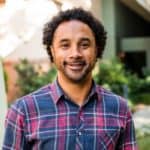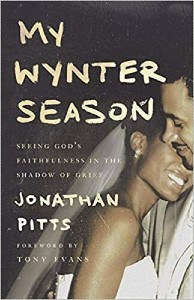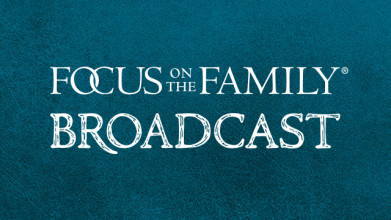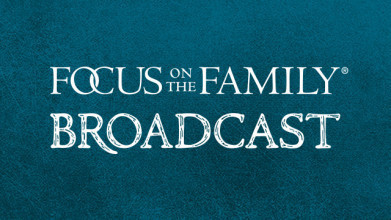Preview:
Jonathan Pitts: The whole time I’m walking through, like, the loss of Wynter and all th-, and all the family members are walking with my girls, like, I never lost my joy. I lost weight. I went through everything else that anybody else grieving would walk through, but I never lost my joy. I never lost gratitude. I never lost perspective of the fact that… ‘Cause even when I think about it, it’s hard to say, ’cause I think for anybody, it’s easy to feel like… I think the fear is that you’d be judged, but the reality is, I was grateful for what God had given me in the season I had with Wynter.
Jim Daly: Right.
Jonathan: And somehow, some way, I knew, instinctually, that if I was still here, God had a plan for me.
John Fuller: Well, that’s Jonathan Pitts, and he joins us today on Focus on the Family to share a beautiful story of God’s grace in the midst of grief. Your host is Focus president and author Jim Daly. Thanks for joining us, I’m John Fuller.
End of Preview
Jim: John, I think one of the hardest things about life on this side of eternity is those unexpected things that happen. Some can be minor, others are major. And, and they turn your life in an entirely different direction. And we can be blindsided by a terrible accident or unforeseen circumstances. And that can sometimes shake our faith. Often it makes you question, “Okay, Lord, are you there with me? What’s happened here?” And it certainly brings up that big question about, “Why would a bad thing happen to me? I’m a good person. I’m seeking the Lord and trying to do the best I can.”
Our guest, Jonathan Pitts, he knows the struggle firsthand. Uh, for just over 15 years, uh, he was married to his wife, Wynter, who is the niece of our good friend, Pastor Dr. Tony Evans. And they visited with us in May of 2018 to talk about raising their four beautiful daughters, and those challenges (laughs) of the teen years. And in July, uh, Wynter, quite suddenly, passed away. I remember hearing the news, and I was like, shocked-
John: Mm-hmm.
Jim: … ’cause a person that young does not pass away. What happened? Uh, she was an author, a speaker, and, uh, really, that up and comer Christian woman leader. And you can imagine that her death really rocked the Christian community. But through that loss, and the trials surrounding it. The unexplainable circumstances, and heart-rending grief, uh, Jonathan found hope and healing. And that’s precisely why we wanna talk to him today, because he’s going to share what it’s like to go through that valley and get back to the mountaintop.
John: Right, and Jonathan Pitts is an author, speaker, a ministry executive and pastor at Church of the City in Franklin, Tennessee. Uh, he’s the current president of Four Girls Like You Ministries. Uh, that was Wynter’s ministry to tween girls and their parents, and now he’s shepherding that along. Um, he is the father of four girls, as you mentioned. And he’s, uh, really beautifully captured the time he and his wife had together in the book, My Wynter Season: Seeing God’s Faithfulness in the Shadow of Grief.
And we do have copies of that book here at the ministry. Stop by focusonthefamily.com/broadcast. Or call 1-800, the letter A, and the word FAMILY.
Jim: Uh, Jonathan, welcome back to Focus on the Family.
Jonathan: It’s good to be with you guys.
Jim: And I know it’s difficult, uh, perhaps, I don’t wanna put words in your mouth, but it’s probably hard, because time has passed, some things have happened that you’re gonna tell us about in a little while. But going back to, you know, that season of your life, where you and Wynter met, and how your relationship grew. And I know there’s an entirely different direction now; we’ll get to that. So, I appreciate the fact that you’re willing to take us back there. Many people won’t know the story. So, let’s go there. Uh, paint a picture of who Wynter was, and how you met.
Jonathan: Yeah, I mean, I met Wynter as, uh, just a girl that was in college with me. Didn’t know Tony Evans or any of the Evans family, I was just, uh, in college, um-
Jim: And she’s Tony’s niece.
Jonathan: She’s Tony’s niece, yeah. Uh, her dad is, uh, brothers with Dr. Evans. And so didn’t know him, didn’t know Dr. Evans, didn’t know any of that. And, um, literally met in school. She had been coming back from a study abroad, and, um, just met her at a party. And, uh, really, what happened is I was kinda minding my business, doing what I felt like God was calling me to do, she was doing the same, and God would, um, bring us together.
Jim: Yeah.
Jonathan: And we’d get married, like, literally two weeks after we graduated from college, and-
Jim: That was, like, seven months after you met. I thought, I thought Jean and I at 13 months was pretty quick, but you did seven months-
Jonathan: Yeah.
Jim: … so you beat us by half.
Jonathan: (laughs)
Jim: (laughs)
Jonathan: Yeah, it was a, a fast-moving process. And… I mean, I was certain of God’s plan for my life, and, you know, really, got married, uh, pretty quickly after we graduated, and would have Elena, my oldest girl, who’s now almost 18 years old, which is crazy-
Jim: Does that shake you?
Jonathan: It does shake me. I-
Jim: 18!
John: (laughs)
Jonathan: I was shook a couple weeks ago for the first time. I was like, “I don’t have a gift for her for her 18th birthday, what are we gonna do? She’s graduating!” So, all those things at the same time, but… Uh, we’d have Elena 11 months after we got married. And so, we, like, really quickly went into family building, um, and would have three more girls. And we were living in New Jersey after we graduated, where I’m from.
And, uh, Wynter was a grant writer, and she was basically having, having babies, trying to figure out her life, while I was in pharmaceutical sales and trying to make as much money as I could. That’s what I thought I was doing.
Jim: Four daughters, you had to.
Jonathan: Yeah, exactly.
Jim: (laughs)
Jonathan: Exactly. But we’d go to Texas for vacation, visit with Dr. Evans, and God would really change our lives there. I would actually fall in the ministry. I’d end up managing Anthony Evans Jr for seven years. He became one of my best friends, and, uh, she would actually, Wynter would end up working for Dr. Evans. So, this, uh, she, the grant writer became kind of like a grant writer for a church nonprofit organization-
John: Yeah.
Jonathan: … and ultimately, would begin feeling called to come home just to be with the girls. She would end up doing creative writing to try to, like, inspire her girls, entertain them, educate them, disciple them. She stumbled upon creating this magazine called For Girls Like You.
Jim: And I want, that was the question I was gonna ask you. I… that happening, I mean, you’re the dad of the four girls, Wynter’s the mom of the four girls, and you decided, uh, something needed to be said through this magazine. So, what was the great goal there-
Jonathan: Yeah.
Jim: … with-
Jonathan: Yeah, well, there was no great goal. I actually was trying to convince her to do hair, ’cause she could make a couple hundred bucks every client-
John: (laughs)
Jim: (laughs)
Jonathan: … and she wanted to do the magazine. And I was like, “Well, we’d make more money if you just did hair.” And anyway, she was, uh, really good at saying no to the things that she wasn’t called to do.
Jim: Right..
Jonathan: And when she finally said yes to the thing that she was called to do, God would just kinda put his wind on it. And, um, what was then, like, 20 little girls that we had, uh, in… It wasn’t even a magazine yet, it was like this, just this little resource. Um, was, like, 20 girls then, it’s, like, more than 6,000 girls now that get the magazine, even-
John: Wow!
Jonathan: … Past-, it’s grown past her life, which is kinda cool when you think about legacy, things we p- invest our lives in. So anyway, she ended up doing that, and really, was doing that, um, the day that she passed away really suddenly, so.
John: In that context, and we’ll get to that story, obviously-
Jonathan: Mm-hmm.
John: … but, um, you and Wynter started, I think in 2018, thinking about leaving the Urban Alternative, moving to Nashville. You becoming a pastor there. And that was all about that time that she passed away. Describe what was happening, and then what your decision was after she passed away.
Jonathan: Yeah, it was a couple things happening. Like, one, I felt like I had grown as much as I could grow kinda within this Evans brand of ministry, and that God had different things for me. And that was obviously a real challenge to leave, ’cause I love the Evans family, still do, still-
Jim: Yeah!
Jonathan: … my family, you know? Um, but I was in, in, in a sense, going to what I felt like was a higher calling, different calling. And at the same time, you know, Franklin, Tennessee, Nashville, that whole area, when you think about Christian publishing. I thought what God was doing with Wynter was kind of giving her this new space to breathe and grow and become what he was calling her to become. So, in every sense, we were really expectant about what the future looked like, and a little bit nervous, but really felt like God was kinda leading the way. And, um, I actually had, um, so I guess I, July 10th, we had bought our home in Franklin. July 14th, we, um, well, moved in July, like, 11th, and we were there for just, like, three days, and we left for a vacation in Iowa with my family. Go back to, we’d go back the house for my last week of work. And, um, that’s where she had actually pa- passed away, in Dallas. Um-
John: Wow.
Jonathan: … and, so that was-
Jim: She never really lived in Nashville?
Jonathan: No, never did.
Jim: Yeah.
Jonathan: We were there… What’s really beautiful is, I think, um, she kinda set the path for us in terms of, like, she was really passionate about getting the girls into a specific school and setting them up for their future. When I look back on it, I’m like, “Wow. How kind of God to allow her to kinda see kinda where, you know, where we’re going, where her girls are going, and then just, like, trust them with the Lord as she-”
Jim: Yeah.
Jonathan: “… went into eternity.”
Jim: Let’s go to that day. There’s gotta be a lot of emotion. And again, we talked about, you know, um, things, positive things that have happened since then. But we need to talk about that day that she did pass away, July 24th, 2018. Kind of the normal day. Describe it. And again, what makes it so difficult, um, how old was she?
Jonathan: 38.
Jim: 38? You just… I mean, that’s gotta come outta the blue; it’s not an expected thing. So, describe the day, what happened, the phone call, however you were informed.
Jonathan: Yeah, I mean, honestly, there was nothing normal at that point. We kind of were homeless. Our, we had bought a house in Franklin that we hadn’t lived in. We went to Iowa for a vacation. We come back to Dallas. I’m finishing up my last week of work for the Urban Alternative. But we have no home in Dallas, so we’re staying, actually, uh, at a kind of a ministry property that Priscilla had, and, um, her cousin. And, uh, I just remember going to work, and I was just saying goodbye to, like coworkers I had, I mean, done real ministry with, loved. Was really sad about that. I was also doing, you know, standard operating procedures, like all the things you do when you leave an organization.
And I’ll never forget, um, uh, she texted me, and she just said, I was actually on my way home, and she said, “I feel,” and then she sent me the sick emoji. And I just asked, “What’s going on?” And she never responded. So, I stop at Costco and get, like, Caesar salad from Costco and ribs. And, uh, I remember driving home and getting home, and my sister-in-law, Andrea, was there with her two girls. Wynter was there with our three youngest girls. My oldest, thank God, was at a water park with her cousin, her oldest cousin, boy cousin. And, um, they were all just kinda sitting on the couch, just hanging out, laughing, and doing each other’s hair. And I remember them playing this game, it’s like, somebody would say, “You can be a fish, but you can’t be an elephant,” or “You can be a th-…” I don’t even know the game, to this day.
John: Right.
Jonathan: So, I remember hearing it, like, “What’s that game?” And I had taken a run earlier that morning, so I was pretty tired. So I went, and I laid down, um, and took, like, a 15-minute power nap. And, uh, Wynter actually had the last book that she would write, ironically, would be called, um, I Am Yours. Um, I Am Yours, um… I’m forgetting the subtitle right now, but it’s basically a book on identity, and there’re these 60 different, um, devotionals that describe your identity in Christ in different ways.
Jim: Oh, wow.
Jonathan: So, she had a deadline, which she was never good at meeting. And, um, (laughs) she, uh, as I walked outta the bedroom to get dinner ready, I just knew I was gonna be on ’cause she had to finish this book, which was already a couple weeks late. And, uh, we just ha-, I, all I remember is passing each other kind of as I walked outta the bedroom and she was walking in. And, uh, but, you know, just doing the thing you do, like-
Jim: Right.
Jonathan: …I’m just going to get dinner ready, she’s gonna take this nap, and then she’s gonna get to work. And that was just, like, I had learned that process. And I’d go back out, I’d, or I’d go out, I’d fix the ribs and Costco (laughs) Caesar salad, and then I just would knock on the door and ask her if she wanted to eat, and she’s like, “No, I’m fine. I think I just need to rest longer.” And so, she just went back to resting, I finished dinner with the girls. And I just went into the bedroom and into the bathroom to floss my teeth, ’cause-
Jim: Right.
Jonathan: … the ribs are stuck in my teeth, and-
Jim: Right. (laughs)
Jonathan: So, I remember walking around, flossing my teeth, and I just kinda looked outta the bathroom, into the bedroom, and, uh, she was sitting up, facing away from me, like, looking outta the windows. And she just kind of slu-… You know, like when you’re, um, kinda tired and lazy-
Jim: Yeah.
Jonathan: … in the bed, and you just kinda, like, slump over like you don’t wanna get up? She kinda-
Jim: Right.
Jonathan: … made a move like that. But I guess I just noticed something unnatural about it, ’cause I just said, “Why are you playing like that?” And bottom line is, the next 30 minutes would be the, probably, most 30 traumatic mome- minutes of my life, because what I’d realize… I thought she was having a seizure. But really what had happened is that her heart, she had a heart murmur, her heart got off rhythm. And what was really chaotic for me, as I did all the things, CPR, and all that, trying to see if she was choking on something, she just basically lost consciousness, and I say, you know, kinda slowly glided into the, into heaven. And, um-
Jim: Yeah, hmm.
Jonathan: … it was super traumatic. My three youngest girls were there, and so just imagine having three girls running around, like, wondering what’s going on, as-
Jim: Right.
Jonathan: … you know, their mom’s laying there.
Jim: It’s a lotta chaos.
Jonathan: Yeah, so-
Jim: I mean, that’s… Mmm.
Jonathan: Yeah, so I, you know, I called Priscilla, actually. And, uh, I’ll never forget this, but it actually happens to be her, her wedding anniversary. And, um, I would call my sister-in-law, and they both came back to the house and got the girls, and we’d make our way, uh, to the hospital after a long time, ’cause that house is out in the country, and so-
John: Yeah.
Jonathan: … they didn’t, the paramedics didn’t get there for a long time, and…
John: Right.
Jonathan: For me, I just knew, I’m a Eagle Scout, trained kinda in CPR and all that. And so, I knew, without a miracle, you know, I wouldn’t speak to her again, so.
Jim: You just knew it.
Jonathan: Yeah, without a miracle. My prayer was just, like, I remember just saying, like, “God,” or I, no, I would say, um, “Wynter, don’t, don’t leave me,” or something like that. “Don’t leave me.” And then I was just praying to God for a miracle. And in one side of my brain, knowing that God can do miracles, in the other, I’m such a practical guy, I’m just practically thinking, like, about all the different ways this could go, in terms of, you know, just, you think about all the things. And so, there was a lot going on in my mind.
Jim: Yeah, I can’t imagine. And, and, and I’m sure she’s not too responsive at that point.
Jonathan: Not responsive at all.
Jim: Yeah.
Jonathan: She was al-, she was gone. The mi-, the minute I basically looked at her, she was, I th-, I believe, already gone.
John: Mmm. This is Focus on the Family with Jim Daily, and, uh, we’re talking today with Jonathan Pitts, who has captured his, uh, compelling story in this book, My Wynter Season: Seeing God’s Faithfulness in the Shadow of Grief. Uh, get in touch for your copy. And if we can be of any help to you in any way, just, uh, please, give us a call, Focus is here to help. Our number is 800, the letter A, and the word FAMILY. Or stop by focusonthefamily.com/broadcast.
Jim: Jonathan, I, I can go back in my own life, when I was nine, and my mom died, and m-, it fell on my brother to tell us all. My most oldest brother, who’s 10 years older than me. And I can just remember each one of us going into the room, and him telling us individually. And I was the last one to be told. I just saw my siblings going in the room, and each one coming out crying. And then he asked me to come in there, and I’m thinking, “I don’t wanna go in that room. Something bad is happening.” Which leads me to that question, ho- how did you tell the girls? I mean, i- obviously, they were aware something was not right. Was there that moment you gathered them together, where you could make a definitive statement about what’s happened, what’s going on-
Jonathan: Yeah.
Jim: … and talk about the future, as hard as that might be at that moment?
Jonathan: Yeah. You know, there’s a lot going through my head, and the, the thing that I knew instinctually I needed to do was just lead my girls as well I c-, as well as I could. It wasn’t about me. That’s kinda how I-
Jim: Right.
Jonathan: … felt in the moment. It wasn’t about me, it’s about them. There were several families that showed up, and I remember, I never f-, I never remember feeling as loved as I felt in that moment, when I w-, I walked out into kinda the waiting room, and I just saw family, and pastors, and just people in our lives that just kinda, like, just stopped everything and came. And, um, Dr. Evans was one of those people. And so, uh, somehow, some way, he had found his way back to, like, this little family chapel, kinda prayer room, I guess. And, uh, I just knew I was going into that room to meet my girls and share with them what happened. Up until that point, they knew that something was going on with mom-
Jim: Right.
Jonathan: … but they weren’t exactly sure. And, um, so, you know, as I’m going in, I’m thinking to myself, “There are lots of things I can say; what do I say?” And I don’t even know how, at this point, like, it’s not me, I feel like God just kinda gave me the words. But the way I think about it now is, there were lots of things that were true in that moment, like, lots of things that were true that I could say, that I could share, but the only thing I knew to share that was true and hopeful was the fact that their mommy went home to be with Jesus. And so-
Jim: Mm-hmm.
Jonathan: … that’s literally what I said. I just said, “Your mommy went home to be with Jesus.” And obviously, at that point, you know, there were no words that were necessary, ’cause there was just so much emotion in the room. But Dr. Evans was there, and I felt like… It’s just really beautiful: this man who had l- literally discipled me as an adult, like, the only man outside of my own dad who spent that much time with me, pouring into me, being there by my side was just real comfort. Um-
Jim: Yeah.
Jonathan: … but we sang a old hymn, and just, like, pushed into the goodness of God in, like, a devastating moment. Not-
Jim: Yeah.
Jonathan: … because emotionally we’re there, because that’s what we knew to do.
Jim: And really, that was, uh, I think, the first, um, family devastation that Dr. Evans experienced. That next year, year and a half, he would see more of the family, the extended family die.
Jonathan: Yeah.
Jim: Describe that, and what the Evans family and extended family experienced.
Jonathan: Yeah. I mean, we all would. So that was, you know, Wynter died first. And then there were six family members within, I think 20 months, uh, that passed away, including… So Wynter, uh, Aunt Lois, as we called her, Dr. Evan’s wife, uh, his dad, uh, which is Two Daddy to Wynter, who was Two Daddy to me. I mean, it was all family, and then-
Jim: Yeah.
Jonathan: … um, Aunt Beverly and Uncle James, and all these different people that went home to be with the Lord. Some of them really suddenly, and then others, like his dad, who was one of the most Godly men I’d ever known… Anyway, it was massive loss, and I feel like what we did was just press into the only hope that we have, you know? I, the scripture says… I knew the scripture before, and I used it as a pastor and as a guy who walked with people through death, that, you know, we don’t grieve as those who have no hope. But that scripture that I kinda talked about, you know, doing death from a little bit more of a distance, I actually lived. Like, not grieving as those who have no hope-
Jim: Yeah.
Jonathan: … became a part of our lives, a part of our family story, I guess, so.
Jim: Well, and I can’t, we’ll I can imagine, ’cause I had to go through it, as well, but when you’re on the one side, as a pastor talking to people going through death, through grief, it’s one thing to know the right passages to express it. But when you have to live through it, it’s different.
Jonathan: Yeah.
Jim: Now you know, at a very heart level, what it means and what it feels like. That’s different.
Jonathan: Yeah. And it’s also, for me, it was very, uh, what’s the word? Relieving, or even, like, inspiring. ‘Cause what it actually means when that scripture says, “We don’t grieve as those who have no hope,” we actually don’t grieve without joy. Like, the whole time I’m walking through, like, the loss of Wynter, and all, and all the family members, and walk with my girls, like, I never lost my joy. I lost weight. I went through everything else that anybody else grieving would walk through. But I never lost my joy. I never lost gratitude. I never lost perspective of the fact that… ‘Cause even when I think about it, it’s hard to say, ’cause I think for anybody, it’s easy to feel like… I think the fear is that you’d be judged, but the reality is, I was grateful for what God had given me in the season I had with Wynter.
Jim: Right.
Jonathan: And somehow, some way, I knew, instinctually, that if I was still here, God had a plan for me. Now, part of that is obviously raising my girls and being here for them and all that. But I knew that I knew that I knew that God had more. And so, it-
Jim: Right.
Jonathan: … didn’t, it didn’t have to be this looking back on always wanting something I had before. I could actually know, without a shadow of a doubt, that God had a plan for my life.
Jim: Well, and in that context, you know, millions of people are listening or watching on YouTube, whatever it might be. What about the person that that is just the next heavy brick, and they do lose their joy? How do you speak to that person, experientially, when they’re saying, “How, how did you do that, Jonathan? I couldn’t do that.”
Jonathan: Yeah.
Jim: And they’re desperate. I mean, I’ve talked to people like that, and they’re going, “How do you get that kinda joy-”
Jonathan: Right.
Jim: “… ’cause I have not experienced that.”
Jonathan: Well, I mean, it’s a tricky question, ’cause I would say I didn’t do anything. I feel like… That’s what was really neat about it, is that it’s probably the most confirming thing about knowing that I believed what I believed, when Wynter passed away, that I still had that. And so, I would say, for anyone, just press into the Lord. Like, He himself is our peace, he is our joy. Like, press into the Lord, because He’s the only one that can give it to you. Um, like, nobody gave it to me, I didn’t give it to myself. Like, the Lord literally gave it to me. And that doesn’t mean I didn’t walk through hard times, didn’t mean I wasn’t angry, didn’t mean I wasn’t sad, didn’t mean I wasn’t, like, really depressed. Like, I g-, you know, I had a great love for football. The Philadelphia Eagles won the Superbowl that year, and I remember being so excited. And then I remember, a couple months later, Wynter passing away, and I’ve not really ever watched a football game since then. Like, I-
Jim: Wow.
Jonathan: … I lost joy in some of the things that I really cared about before-
Jim: Right.
Jonathan: … but I never lost joy in the Lord. So, it’s a different-
Jim: Right.
Jonathan: … kinda joy that I feel like is God-given.
Jim: Well, what I’m hearing you say there, too, is it’s okay to press into God, to be angry, to shake your fist, and God’s big enough to take it-
Jonathan: Yeah, I-
Jim: … and not to hold back in that area.
Jonathan: Yeah, I would say, now, I think everybody has a different experience, so I never had that level of anger. Like, I never felt like I was every actually angry. And then I remember being annoyed about things, and I’d have this freeze: I’d say, “I didn’t ask for this.” And a lotta that came later, when I started to make different life choices, and think about my future and all that, I’d say, “I didn’t ask for this.” ‘Cause a lotta the times, as someone who’s walked out of a season like that, you feel like a lotta people around you, they feel responsible to keep you kinda where you are, or they feel responsible to help you not make bad decisions. So, I’d say, “I didn’t ask for this.” That’s what I would consider anger. So, we all have different experiences, and I can’t say my experience summarizes everybody else’s, but-
Jim: Mmm.
Jonathan: … I would say press into the Lord, because-
Jim: Yeah.
Jonathan: … He’s literally the only joy, the only peace, the only real foundation that we have in this world.
Jim: And I think when you get that, that’s where that natural spring of joy comes from; it’s not contrived, it’s not fake, it’s, “You know what? I can, I can deal with the setbacks in life because my strength’s in Christ.”
Jonathan: Yeah. And guess what? I’m still having to do it. (laughs)
Jim: Yeah, yeah!
Jonathan: They’re still coming, you know?
Jim: But it’s different.
Jonathan: Yeah.
Jim: You’re not overcome-
Jonathan: Yeah.
Jim: … by your circumstances.
Jonathan: Yeah.
Jim: Hey, Jonathan, at the end here, uh, the thing that caught my attention outta the book is you stuck with the plans to move to Tennessee and keep that momentum going forward. And, you know, I guess one of the questions is, why? What made you committed to that move, even just after your wife had died? And was it the right thing?
Jonathan: Yeah, I’ll start with the end. I think it was the right thing. And God knows me, um, I’m a loyalist, and, you know, I was, I would say, in this Evans’ brand of ministry for almost 15 years of my life. And that was the first stepping outside of that. And I feel like if I wouldn’t have walked outta that, I probably would have never found myself fully again, ’cause I woulda just committed to fit myself to the thing I knew. And I think God knew that, and He wanted me kind of-
Jim: Huh.
Jonathan: … not outta that ’cause it’s a bad thing, but just outta that-
Jim: Right.
Jonathan: … because He knew He’d have to make me a new man. Like, He’s constantly making us new. He’s constantly changing us. And I, I think I would’ve been just in that, and I woulda just committed my life to a beautiful ministry, but ultimately, probably would’ve, like, not gone where God wanted me to go.
And so, you know, I was, Wynter passes, um, we ended up burying her in Dallas. And I’ll never forget the day before her funeral, uh, two things happened. One is my now boss, Darren Whitehead, Senior Pastor to the Church of the City, he called, and he just said, “Hey,” um, “if you, if you guys don’t wanna come, just know this: we’ll, we’ll sell your house, we’ll get your stuff back, we’ll take care of things. Don’t worry about it. If this is what you wanna do, if you wanna stay in Dallas, then know that we’ll support you in that.”
Jim: Wow.
Jonathan: And then he said, “If you come, you’ll find a family ready to adopt you.”
Jim: Hmm.
Jonathan: And he meant every word of that. And that same day, I was walking on the sidewalk in front of my sister-in-law’s house, on that phone call with him, it was the one place for peace for me that week, was on that sidewalk, walking back and forth, that happened. And then I can’t remember if it was before that or after that, but in that same day, I’m walking with my daughter, Elena, and, um, she’s just asking me, ’cause the girls had asked me a couple times, “Dad, are we,” you know, “are we gonna go to Nashville? What are we gonna do?” But Elena just, we were walking, and she just goes, she’s, at this point she’s 14, and she says, “Dad, are we going to Nashville, still?” And I said, “Well, we need to p-,” I’m, b- me being a good leader, right, uh, “but we need to pray about it, and take our time.” And she goes, “Well, I think we should go.” Like, “Mommy was more excited than any of us to go. I think we’re supposed to go.”
Jim: Wow.
Jonathan: And it was like the Holy Spirit just used that to kinda tip me-
Jim: Yeah.
Jonathan: … over the edge, out of, like, probably, at that point, fear of leaving everything I knew for something I didn’t know, which was a big step of faith. And so those two things happened. It was a, just enough, like, light over there to just say, “Okay, just keep walking.” And-
Jim: Yeah.
Jonathan: … I would say, what happened next would be really three, almost three years of being in what I would call an incubator of, um, healing from grief in this beautiful little town. If, if you’ve ever been to Franklin, Tennessee, or if you haven’t, you need to go. It’s like this beautiful little quaint town, where… I don’t, it’s just, it’s just a gorgeous town. And the church wrapped their arms around us, the community wrapped their arms around us. And I was pa-, a new pastor coming into this church, and you would’ve thought these people knew me for years, the way that they just, like-
Jim: Yeah.
Jonathan: … I mean, I came back to a house that wasn’t unpacked, and our home was unpacked.
Jim: Oh, wow…
Jonathan: And it looked like we had lived there for five years, you know? Like-
Jim: Wow.
Jonathan: … pictures on the walls, and all the things. And they really just took care of us, and it was God’s kindness. Um, in addition to that, my oldest sister, who had never been married, uh, her name’s Carmen, she moved in with me, and lived with me, um, for the, like, for, uh, I guess almost three years.
Jim: Kinda kept things moving.
Jonathan: Yeah. And really, she’s got a m-, a master’s degree in counseling, and came-
Jim: Oh, my goodness.
Jonathan: … into be a, in, in house counselor, uh, in our home.
Jim: What a blessing.
Jonathan: Yeah, she was great.
Jim: And let’s, let’s end there, because, uh, the good news is, the Lord has brought a new wife into your life, and, uh, that’s fantastic, and-
Jonathan: Yeah.
Jim: … a mom for the daughters, and-
Jonathan: A beautiful woman who, uh, sh- she would say, Pita would say, and we’d say together, that I’m her redemption, she’s my redemption, and we’re the girls’ redemption. And that’s really what we’ve, even as we’ve walked through, even really hard times, you know-
Jim: Sure.
Jonathan: … you blend a family and all that, like, I didn’t know how difficult that part of it would be.
Jim: Yeah, hmm.
Jonathan: But we’re just trusting, um, as we walk, that God’s just redeeming all things, ’cause that’s what He does.
Jim: He’s a Redeemer.
Jonathan: Yeah.
Jim: Yeah. The great Redee- Redeemer, and that’s what you’re getting at, Jon, and I so appreciate it. If you don’t know the Lord, get ahold of us. I mean, (laughs) why live a life without God? I mean, I still, it puzzles me that people that reject God. Why?
Jonathan: Mmm.
Jim: Someone who loves you, cares about you, wants the best for you. It’s the best transaction you’ll ever have (laughs), eternal life. But Jonathan, thank you for sharing, thank you for your openness, and talking about what grief looks like, and how to stay connected to God through that, and, uh, His abundance, which comes right outta John 10:10, right?
Jonathan: Yeah.
Jim: And it’s wonderful to hear that story.
Jonathan: I’ll, I’ll end with just saying this. Dr. Evans has this saying: “If all you see is what you see, you’ll never see all there is to be seen.” And, uh, it’s just one of those things I’ve tried to live by, to see beyond what I can see with my natural eyes.
Jim: Yeah, and it’s so good for all of us to remember that, and so get ahold of us. I’d love to put a copy of this book into your hands, My Wynter Season. If you can make a gift to Focus for any amount, we’ll send it as our way of saying thank you. If you can join us on a monthly basis, that’s great. If you can’t afford it, get ahold of us, it’s a wonderful story, it’s a God story, and we’ll get it into your hands and trust others will cover the cost of that. But, uh, Jonathan, thank you so much for being here.
Jonathan: Yeah, thanks for having me, guys.
John: And let me add that we have caring Christian counselors here on staff at Focus on the Family, and it’d be a privilege to have a consultation arranged for you. Uh, get in touch. Our number is 800, the letter A, and the word FAMILY, uh, to set up one of those, uh, free consultations and to get a copy of this book, My Wynter Season, by Jonathan Pitts.
Find out more when you stop by focusonthefamily.com/broadcast.
Well, plan to join us again tomorrow, as we hear from Cynthia Tobias. She’ll have insights into how to get along with strong-willed adults in your life.
Preview:
Cynthia Tobias: At our best, when we’re strong-willed, we’re willing to tackle what those say, others say can’t be done. We’re resourceful. We’re undaunted by circumstances. And we’re good at creatively energizing people around us.
End of Preview






















